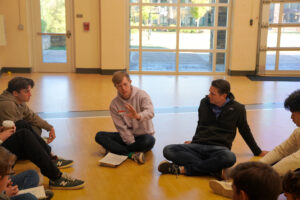Last week, Fellows Class 18 read John Lynch’s The Cure. This book examines how humans choose to pursue “good intentions,” attempting to please God rather than choosing to love and follow God. We lose sight of God’s desires for us and strive to attain the lives of “good believers.” Often, we fail to remember that what God truly desires is our love and affection for Him. Matthew 6:33 states, “But seek first the kingdom of God and his righteousness, and all these things will be added to you.” Good actions will never lead us to a right relationship with Him. Rather, when a sincere relationship with God is present, good actions will then follow.
Lynch provides us with a “cure” to fix this warped view of our relationship with God and others. The key component of the cure is taking advantage of the grace gifted to us. Grace means undeserved favor. God is a loving and gracious Father, and His favor never depends upon our ability to perform for Him or others. When we accept Jesus into our lives, we recognize that we are flawed beings in need of a savior. We humble ourselves before Him and accept the unimaginable gift of grace He bestows upon us. God’s grace is central to our story.

The world tells us our identities can be found in our sexuality, popularity, abilities, or possessions. As followers of Christ, our identity should solely be found in Christ. Ephesians 2:10 states, “For we are God’s handiwork, created in Christ Jesus to do good works, which God prepared in advance for us to do.” We are said to be God’s handiwork; how incredible that blessing is! God has not only created us in Christ Jesus, but He has also designated a purpose for us in this life, to do good works. When we identify ourselves in Christ, we leave behind the pressures of this world, along with guilt, shame, pride, fear, and selfishness. We gain something more meaningful and life-giving than anything this earth could ever offer. We gain the love of Christ. We are chosen and loved by Him, and we have the opportunity and obligation to share this love with others.
 I (Molly Kate) preach these truths to myself, and yet, I still fall back into seeking my identity from earthly things. I’m prone to thinking that God’s love for me is based upon my works and actions, for instance, how much I pray. This is false. Thank goodness! All the weight of performing for Him can cease because He doesn’t ask me to be perfect. In The Cure, Lynch writes that “Grace is the face love wears when it meets imperfection.” God has never expected us to be perfect and without flaws. He created us and He understands human nature. This is where grace comes in to save us all! Jesus’ faultless blood provided the means by which God extended grace toward us. I feel remarkably reassured when I realize that no matter what I’ve done, God loves and cherishes me. He is where I place my identity. Living by these truths changes not only our relationship with ourselves and God but also with others. When we adopt God’s love, we can extend this love to those around us.
I (Molly Kate) preach these truths to myself, and yet, I still fall back into seeking my identity from earthly things. I’m prone to thinking that God’s love for me is based upon my works and actions, for instance, how much I pray. This is false. Thank goodness! All the weight of performing for Him can cease because He doesn’t ask me to be perfect. In The Cure, Lynch writes that “Grace is the face love wears when it meets imperfection.” God has never expected us to be perfect and without flaws. He created us and He understands human nature. This is where grace comes in to save us all! Jesus’ faultless blood provided the means by which God extended grace toward us. I feel remarkably reassured when I realize that no matter what I’ve done, God loves and cherishes me. He is where I place my identity. Living by these truths changes not only our relationship with ourselves and God but also with others. When we adopt God’s love, we can extend this love to those around us.
Molly Kate Carley
Sumrall, MS
